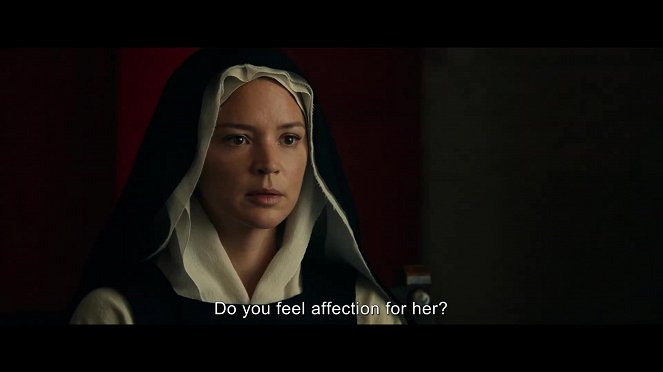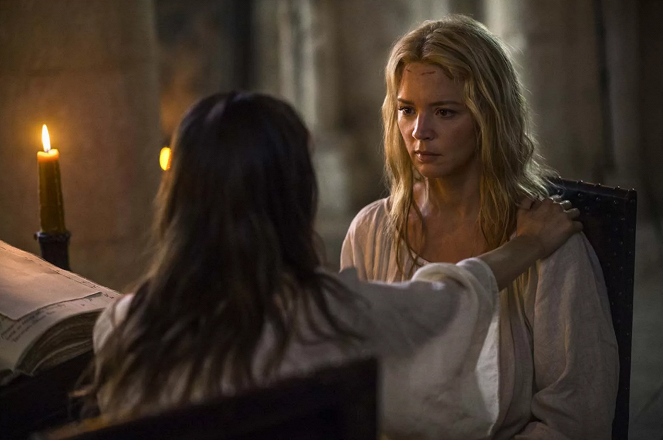Regie:
Paul VerhoevenKamera:
Jeanne LapoirieMusik:
Anne DudleyBesetzung:
Virginie Efira, Charlotte Rampling, Daphne Patakia, Lambert Wilson, Olivier Rabourdin, Clotilde Courau, Louise Chevillotte, Hervé Pierre (mehr)Streaming (5)
Inhalte(1)
Italien im 17. Jahrhundert: Hinter den Mauern des Klosters von Pescia versetzt die Novizin Benedetta Carlini (Virginie Efira) die Oberhäupter der katholischen Kirche in Aufregung, als die Wundmale Christi an ihrem Körper auftreten. Trotz anfänglicher Zweifel an der Echtheit der Stigmata steigt Benedetta als „Auserwählte Gottes“ zur Äbtissin auf. Von nun an genießt sie Privilegien in der Ordensgemeinschaft, die ihr ein geheimes Doppelleben erleichtern: Sie lässt sich von der Nonnenschülerin Bartolomea (Daphné Patakia) in die Geheimnisse körperlicher Lust einführen. Doch die ehemalige Klostervorsteherin Felicita (Charlotte Rampling) kommt dem verbotenen Treiben auf die Spur … (Capelight Pictures)
(mehr)Videos (6)
Kritiken (9)
So fühle ich irgendwie, dass Paul Verhoeven nach seinem achtzigsten Geburtstag definitiv keine Notwendigkeit mehr hat, irgendjemandem zu gefallen, und daher einen neuen Film ganz alleine für sich selbst gedreht hat und ganz nach seinem Geschmack. Das Ergebnis ist für mich also eher ein B-Film des Nunsploitation-Genres anstelle eines hochwertigen Kunstfilms, bei dem der Regisseur erneut seine große Provokationsfähigkeit und schwarzen Humor zur Schau stellt. Ich bin immer noch ganz auf seiner Welle und werde wahrscheinlich alles, was er mir präsentiert, in mich aufnehmen, aber mir ist klar, dass Benedetta definitiv kein Film für jedermann sein wird.
()
Ein erotischer Film über Nonnen, der in einem italienischen Kloster im 17. Jahrhundert vor dem Hintergrund einer Pestepidemie spielt. Es handelt sich um einen ziemlich unausgeglichenen Versuch, das B-Movie-Genre auf ein A-Level-Festivalniveau zu heben, der vor allem aus der Tradition der italienischen Ausbeutungsfilme mit Nonnen (sogenannter "Nunsploitation") schöpft. Paul Verhoeven hat seine Markenzeichen und Lieblingsobsessionen, darunter beißende Ironie, Sadismus und Perversion oder Feminismus, in diesen Film eingebaut, der zusätzlich mit einem spöttischen Angriff auf die Kirche als heuchlerische Institution, die von Machtinteressen geleitet wird und der sexuellen Freiheit im Wege steht, gewürzt ist. Wir verfolgen seine Heldin, eine junge Nonne, die lebhafte Visionen der Offenbarung Christi erlebt und eine lesbische Erweckung mit einer neu ankommenden Novizin erlebt, seit ihrer Kindheit in einer Reihe von sakrilegischen Eskapaden, deren Geheimnis (möglicherweise ein echtes göttliches Wunder, möglicherweise nur ein inszeniertes Schauspiel mit eigennützigem Ziel) der treibende Motor des gesamten Films ist. Der Film schwankt die meiste Zeit zwischen alberner und zynisch-schwarzhumoriger Farce über den Missbrauch von Gläubigen (mit Furzen, Ausscheidungen, schelmischen pornographischen Motiven und Jesus Christus selbst als Beschützer, der den Feinden sogar den Kopf abschneidet sowie wilde Tiere) und quälendem, ernstem Drama mit schwerer Musik und naturalistischer Gewalt, das von einer wahnsinnigen Frau, die zu Selbstverletzung neigt, und den negativen Auswirkungen fanatischen Glaubens handelt. Das Aufeinandertreffen dieser beiden tonal gegensätzlichen Herangehensweisen erweist sich als ziemlich problematisch und unbefriedigend, was Verhoeven jedoch egal sein kann, weil er sich anscheinend nur austoben, provozieren und schockieren wollte, was ihm gelungen ist. Benedetta fällt auch deshalb in die Kategorie von grenzwertigem Vergnügen, das für Mitternachtsvorführungen auf Festivals geeignet ist und das Publikum spalten wird, in dem jedoch nicht die Darstellerinnen des Liebespaares, sondern Charlotte Rampling in der Nebenrolle der skeptischen Mutter Oberin am meisten strahlt.
()
Benedetta has spent most of her life in a convent, but now besides God, she started to love Bartolomea... what initially appears as a drama about forbidden love, in Paul Verhoeven's direction turns into a provocative and unpredictable story that opens up a lot of interesting topics and cleverly manipulates with the audience, their expectations, and the way it processes what happens to the protagonists on the screen. Equally daring, cynical, clever, and entertaining as the director's greatest classics.
()
Lesbian nunspoitation by Verhoeven set in a 17th century Tuscan monastery. Verhoeven has made an unconventional erotic religious drama that is not afraid of nudity and violence. The actress who plays Benedetta, Virginie Efira, looks very good at 45, and her full frontal nude will please many a male eye, but the rebellious Daphne Patakia looks good too – she is the hottest nun I have ever seen. The combination of sinful nuns and a corrupt Christian institution works surprisingly well. The historical period where Europe was gripped by the Plague, the very intense and exciting lesbian sex scenes, the Stigmata vignettes, the great nightmares of Benedetta (the snake scene or the brutal killing of the knights, surprised by the raw gore). I liked the harsh rules the nuns had to follow and the intense finale is solid, with a cool trial, torture and chaos of the townspeople. The pacing is slower in places, but the film managed to keep my attention thanks to the attractive interludes. Definitely a noteworthy affair.
()
In an effort to track down the truth about the life of the lesbian nun Benedetta Carlini, Verhoeven employs the formula of historical biography to analyse the Church’s model of power, in which faith is only one of the means of survival and maintaining dominance. Until the end, the film does not give a clear answer as to whether the protagonist really communicates with saints and possesses mystical abilities, or whether she is merely capable of exploiting the fears of others. Due to the impossibility of a rational explanation of some of the events depicted in the film, both interpretations remain possible. As in Total Recall , there is not a clearly defined line between reality and illusions or dreams. In any case, the Dutch filmmaker approaches belief in the supernatural with cynical humour and a sense of the grotesque, both of which are apparent in the arrangement of the mise-en-scene, working with the aesthetics of contradiction and ambiguity, and in the composition of the shots. As a complex, ambivalent female character, Benedetta alternately elicits sympathy and repulsion. Though she promises her followers protection from the plague that is decimating the Italian population, she mainly pursues her own gratification. Salvation and redemption are only illusions. Unlike the unquestioningly listening, frightened and thus easily manipulated crowd, we see that it is not Jesus but rather the closed city gates that provide protection against the disease. No divine forces, just a lockdown. Besides her intelligence and charisma, what makes her a credible religious figure are the stigmata that she inflicts on herself with a shard of glass. Consequently, she can determine what God’s will is and cheerfully abuse the fact that each of the nuns interprets the language of God in her own way. For Verhoeven, religion is not a matter of inner conviction, but rather a culturally, geographically and historically defined phenomenon that serves momentary biological needs and the interests of power. Anything can be justified by God. A similar approach to the clergy is taken by other representatives of the Church, whose hypocrisy Benedetta points out through her own deeds as she retreats into the background in the second half of the film. After the arrival of the nuncio, she changes from a character who abused power in an ethically dubious way to a representative of the resistance against the system, using her own body and sexuality for emancipation. The struggle for dominance, which sets the dynamics of the narrative, is thus unpredictable and suspenseful until the final minutes of the film. Verhoeven typically is not judgmental, nor does he cheer for any side. With a sociological interest, he only studies from afar how easily – regardless of the period – faith can be transformed into an instrument of control and how much a person’s value and power depend on the given historical situation. 85%
()



Werbung